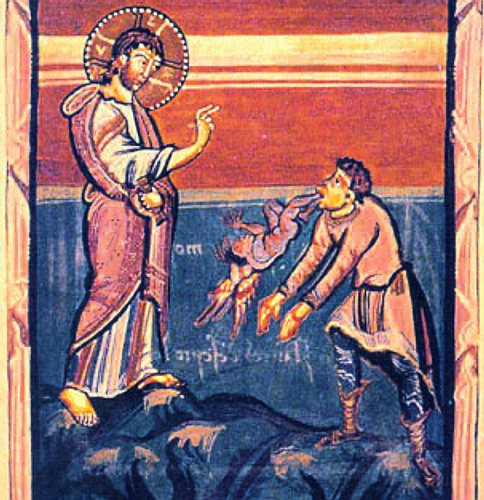
We choose our friends, but not our family, the proverb goes. Neither, I think, do we choose where we were planted.
I have been reading Mark -- mainly because I almost always read Luke and do not like John so much and therefore tend to go a long time unacquainted with Mark -- and I have stopped temporarily at the parable of the good seed. That was on Saturday. On Monday, yesterday, I went along toward the great metropolis where the Wal*Mart has replaced the K-Mart (a friend of mine defines "New South" as "n. the thing that exists just before the Wal*Mart replaces the K-Mart"), and I hit a familiar pothole in the road. Driving a sleek sports car as I do, each pothole is noticed, and I would not wish to ruin my fine suspension with one.
This particular pothole is, as I said, familiar. It is familiar because I hit it regularly. First, I hit it because I am in position to hit it after I dodge a prior hole. Second, though, I hit it because a shadow falls across the road just at that point and obscures the hole. Since I have no depth perception due to an old dueling accident, I use light and shade to determine distance as I drive, and therefore I miss this hole nearly every day that I go on that road.
As I worried about my finely tuned linkages, I absolved the pothole of any responsibility. I realized that, when it comes to blame, there is none. The tree came first (it is a white oak), and the road is the newcomer. The pothole chose to occur in the shade of the tree -- probably literally -- rather than the tree choosing to hide the hole from me.
That led me to consider something. It's hard for trees. Trees have trouble enough without us, and then we add more. Watch a construction site some time, and you will notice that the first act of builders is to blow hell out of every tree. They will then mow, push, level, and then pave. After that, they will pour cement where they want it, build the object desired, and then finally come back in and, at great cost, plant trees that are of a different type, different family, and different but uniform age, to "ornament" the place. (I link there, because some land was given to that university on condition that none of the trees be harmed. The bulldozers blew hell out of every tree, and then they said, "Oops. Do you want the land back now, lady?")
What can a tree do? It doesn't choose its family, nor its genus or species. It doesn't choose its location, either, and in that way it has an even worse time than we do. We can get violent -- most often do -- and take aim at body or mind, or shrink to nothingness, or wander off into the wild to die horribly from some inexorable Universe that will be deaf to our cries. (I wonder if more male geriatrics wander off to their deaths than female? I would hypothesize so.)
A tree is stuck, waiting for fungus, storm, drought, or the axe to drop it.

It's only hope is to hide.
A neighbor across the way had pines growing all around his house. His house had been built according to the usual plan -- meaning that whatever had been there had been blown hell out of and pines had been planted because they grow quickly and drop needles and cones that people like -- and there was a veritable corona of telephone-pole-straight pines all around his house. Then, though, his brother or brother-in-law, who, like him, was on a fixed income, had a pine fall into the house during a storm. After the premium increase, the deductible, and everything else, he was ruined. The neighbor concluded, therefore, that the stupid pines were more stupid trouble than they were worth -- the stupid things. He and his son, therefore, went out to clear them. They hired a local free agent to haul the trees, but he and son did the cutting.
The buzzing and crashing went on all day. When they were done, they were in a little house on a prairie. They were small bubble of brick on a blight and stumps, although they hired men with tractors to pull the stumps up. (Pines are easy that way.) The thing is, he missed one.
He didn't see it. He and his grown son both kept on cutting, and they walked around a tree all day without seeing it. That pine tree had learned the great secret of knowing how to hide.
Some trees are lucky and clever and learn the mystic secret of hiding from us, from pests, from storms. In their dotage, of course, they will forget and be caught, but the trees that evade, the ones that face up to their circumstances and limitations -- these are heroes, I think.















